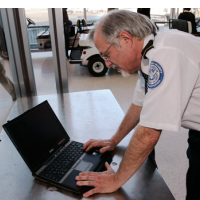Federal Court Limits Cell Phone and Laptop Searches Near Border
 (photo: Mike Derer, AP)
(photo: Mike Derer, AP)
The nearly limitless power of federal agents to search the wireless phones, laptops and other digital devices of U.S. citizens who happen to be at or near the border was curtailed slightly by a decision last week of the U.S. Court of Appeals for the Ninth Circuit. The court, which decides appeals arising from nine Western states, ruled that border agents must have at least a “reasonable suspicion” of criminal wrongdoing in order to seize electronic devices and perform forensic examinations of them—the first court to apply any restriction to the so-called “border exception” to the Fourth Amendment.
In the case, United States v. Cotterman, federal agents in 2007 detained Howard Cotterman at the border in Lukeville, Arizona. Finding a laptop with numerous password-protected files, and knowing that Cotterman had been convicted in 1992 for having sex with a minor, agents seized the laptop without a warrant and let Cotterman go. A thorough, two-day long forensic examination eventually revealed 378 images of illegal child pornography, for which Cotterman was convicted.
The appeal decided Friday concerned Cotterman’s argument that his Fourth Amendment rights were violated by the seizure and forensic examination of his laptop. The Fourth Amendment states as follows: “The right of the people to be secure in their persons, houses, papers, and effects, against unreasonable searches and seizures, shall not be violated, and no Warrants shall issue, but upon probable cause, supported by Oath or affirmation, and particularly describing the place to be searched, and the persons or things to be seized.”
The Court of Appeals ruled against Cotterman, but recognized the unique role devices like laptops and wireless phone have come to play in early 21st century life. “Laptop computers, iPads and the like are simultaneously offices and personal diaries,” wrote Judge M. Margaret McKeown for the majority. “They contain the most intimate details of our lives: financial records, confidential business documents, medical records and private emails. This type of material implicates the Fourth Amendment's specific guarantee of the people’s right to be secure in their ‘papers.’”
Despite ruling that agents had a “reasonable suspicion” of Cotterman sufficient to seize his laptop without a warrant, the eight-judge majority came in for sharp criticism from three dissenters. Led by Judge Consuelo M. Callahan, the dissenters argued that “Whether it is drugs, bombs, or child pornography, we charge our government with finding and excluding any and all illegal and unwanted articles and people before they cross our international borders,” and that the rule adopted by the case “will severely hamstring the government’s ability to protect our borders.”
-Matt Bewig
To Learn More:
Appeals Court Curbs Border Agents’ Carte Blanche Power to Search Your Gadgets (by David Kravets, Wired)
9th Circuit Gets Tough on Border Gadget Searches (by Tim Hull, Courthouse News Service)
United States v. Cotterman (Ninth Circuit Court of Appeals, 2013) (pdf)
Homeland Security Approves Seizure of Cell Phones and Laptops within 100 Miles of Border; Report Remains Secret (by Matt Bewig, AllGov)
- Top Stories
- Unusual News
- Where is the Money Going?
- Controversies
- U.S. and the World
- Appointments and Resignations
- Latest News
- Trump Orders ICE and Border Patrol to Kill More Protestors
- Trump Renames National Football League National Trump League
- Trump to Stop Deportations If…
- Trump Denounces World Series
- What If China Invaded the United States?






Comments